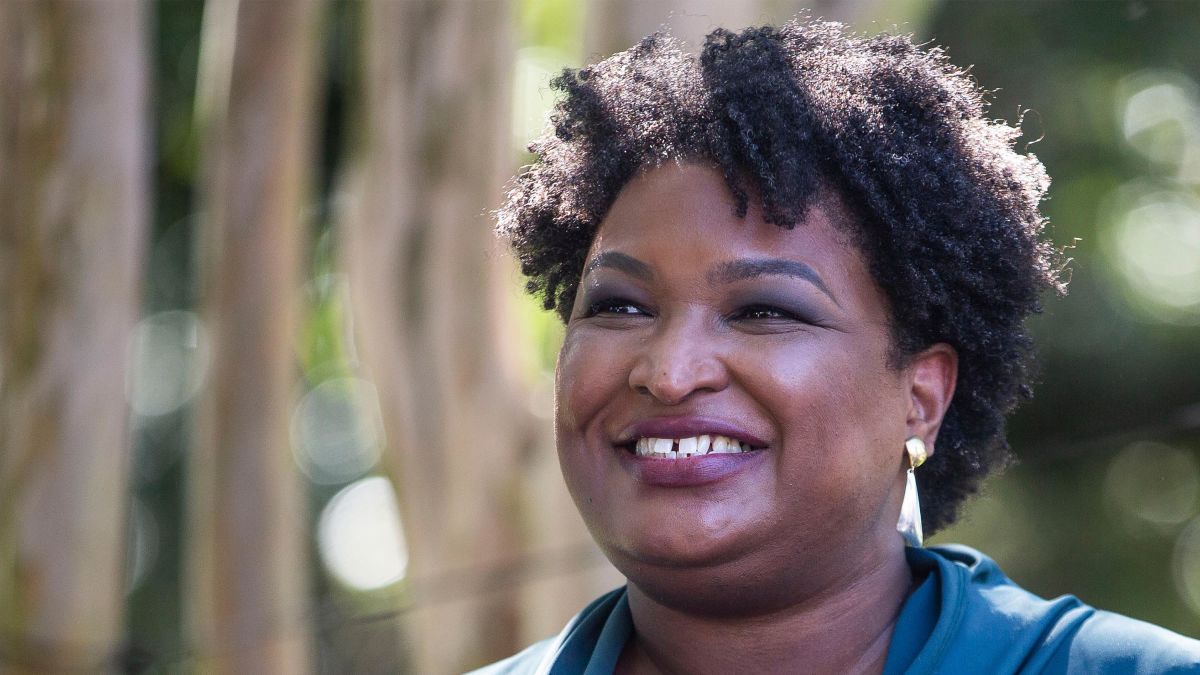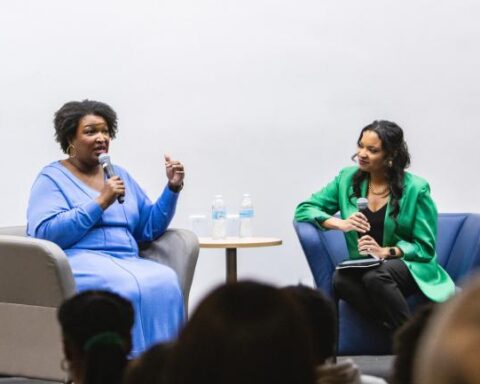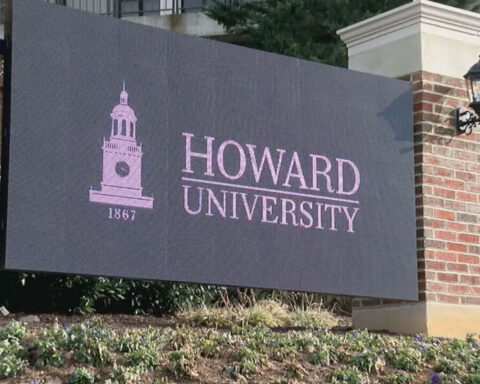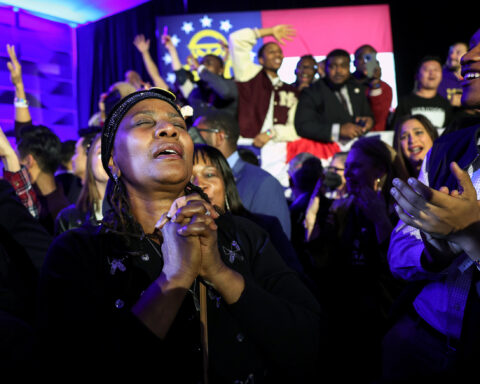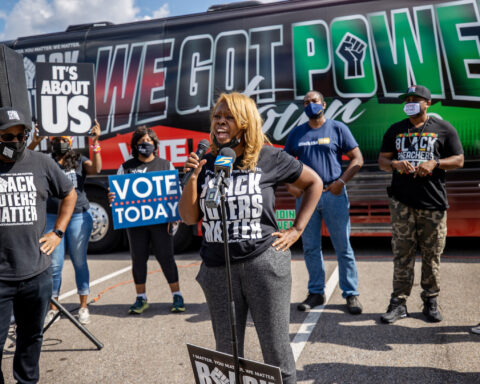Stacey Abrams’ 2022 campaign for Georgia governor represents a generational opportunity for Black women in American politics. It’s a potential game-changer for parts of the South that continue to rely on voter suppression to retain power.
Abrams, who announced on her candidacy Wednesday on Twitter, is easily the highest-profile Black female political leader in the country who does not currently hold elected office. Abrams’ brilliance as a service-oriented leader, former elected official and voting-rights advocate places her in a long unbroken line of Black women organizers and activists who have sought to reimagine American democracy.
While she may not become the first Black woman governor in America, as a public figure and a candidate, Abrams represents an enduring tradition of radical democratic political activism by Black women. It’s one that has the potential to break down centuries-old structures of exclusion and violence that have not only marginalized Black women and the Black community but have also stifled America’s democratic progress.
Since losing a closely-fought 2018 Georgia governor’s race by a margin of 1.4 percentage points to Republican Brian Kemp, Abrams has emerged as America’s most prodigious voting-rights organizer and high-profile activist. The wording of her announcement speaks volumes about her experience in 2018 fighting back against her opponent’s efforts to keep tens of thousands of Georgians, disproportionately African American, from casting a ballot. She tweeted she is running now “because opportunity in our state shouldn’t be determined by zip code, background or access to power.”
In the aftermath of her 2018 defeat, Abrams organized the largest get-out-the-vote effort in the history of the Peach State, helping Democrats to reclaim the US Senate through the victories of Raphael Warnock and Jon Ossoff, while also pushing President Joe Biden to an unexpected victory there.
Abrams’ rising national star found her in contention to be Biden’s vice-presidential running mate, a position that ultimately went to the more politically centrist then-US Senator Kamala Harris from California. A former Georgia State legislator with law and public policy degrees from Yale and the University of Texas’ LBJ School of Public Affairs, respectively, Abrams has been an indefatigable political organizer, one with a jeweler’s eye for spotting talent.
Abrams’ work puts her in historic community with the bold work of Black women activists, freedom fighters and elected officials who came before her. Nineteenth century Black women suffragists including Frances Ellen Watkins Harper and Mary Church Terrell battled racism, sexism and White supremacy for decades in an effort to secure citizenship and dignity for African Americans. They helped to model ways to combat intersectional oppression (by race, gender and class) and became exemplars of a powerful feminist call for expanding the nation’s democratic imagination to recognize and amplify Black women’s leadership. Terrell and Harper organized civil rights organizations, clubs and networks that centered Black women’s political voices, strategic innovations and democratic insights as integral to achieving freedom for the Black community and the nation as a whole.
Black women’s advocacy for a truly inclusive democracy resonates deeply in our own time as well. 2020’s racial and political reckoning heralded a long awaited national and global recognition of Black women’s organizing. From the grassroots moral and political crusade ignited by Black feminist leadership behind the Black Lives Matter Movement to the electoral organizing by Abrams and the election of the first Black woman vice president.
Abrams’ organizing and the votes of millions of Black women nationally helped to secure so many of the 2020 political victories for Democrats, yielding crucial dividends. Bolstered Democratic power allowed for passage of a pandemic bill that centered racial equity and the recent infrastructure package, the largest investment of its kind made in generations. The bill includes $65 billion dollars aimed toward reversing decades of racial disparities in infrastructure spending, although how to spend this money is left largely up to individual states. While these policy and legislative victories are still in progress, they would not have been possible without Black women’s organizing at the grassroots, service-oriented leadership in the electoral, nonprofit, religious, business and public sector arenas, and their inspirational belief that America’s best days are ahead of us if we are courageous enough to prioritize people over punishment.
In Congress, the voices of progressive Black women, such as Reps. Ayanna Pressley from Massachusetts and Cori Bush of Missouri have pushed the Democratic Party to champion bold, innovative and inclusive policies on a scale that matches the enormous challenges of this current moment. This past summer, Congresswoman Bush leveraged enough pressure on House Speaker Nancy Pelosi and Biden to get the president to sign a 60-day eviction moratorium, an issue that aided countless low-income communities facing housing insecurity amidst the pandemic and its various recurrences.
There is so much more work that needs to be done. Whether or not she is elected in Georgia next year, Abrams is uniquely positioned to push for the progress we need.
Abrams faces stiff political headwinds, particularly thanks to GOP voter suppression efforts and, thus far, the failure of the Democratic Party to pass voting rights legislation ahead of next year’s midterms. Historically, the party in power suffers significant losses in midterm elections, a byproduct of historical trends, dampened voter enthusiasm for incumbents, and renewed energy by voters supporting the party out of power. Democrats’ inability to pass voting rights protections, especially for a state such as Georgia which is trending blue, makes it more difficult for Abrams to make history by becoming the first Black woman elected governor. Ever.
Yet this is also a time of great promise and generational opportunities. Abrams’ willingness to engage in the hard work of democracy offers an important example to future leaders, especially young Black girls and women who often witness a political arena that devalues everything but, sometimes, their votes. An Abrams victory in Georgia, the state where the reorganized Ku Klux Klan came once again to life in 1915, would reflect a startling New South, one more than a century and half in the making, delayed by racial violence and terror after the Civil War, but no longer denied.
Georgia is also the birthplace of Dr. Martin Luther King, Jr., the celebrated civil rights leader whose vision of turning America into a “Beloved Community” free of racial oppression, economic injustice and violence still calls out to us today. In fact, Warnock, who became the first Black senator elected from the Peach State, presides over King’s former pulpit at Ebenezer Baptist Church in Atlanta. Abrams’ endorsement of Warnock proved pivotal to his runoff victory over Republican Kelly Loeffler, a win whose cascading effect of enormous Black voter turnout helped to push Ossoff over the top as well.
Abrams reminds us that, in the words of prison abolitionist Mariame Kaba, “hope is a discipline.” It’s the kind of discipline that illuminates a potential path beyond the Big Lie of the stolen 2020 presidential election, disingenuous and toxic anti-critical race theory legislation and a politics of fear aimed at furthering our divisions.
Her example informs even as it inspires. Abrams’ commitment to a vision of American democracy expansive enough to see a progressive Black woman lead the state of Georgia is a stirring call for civic engagement, robust democracy and equal citizenship that should serve as a model for a new generation of public servants.

